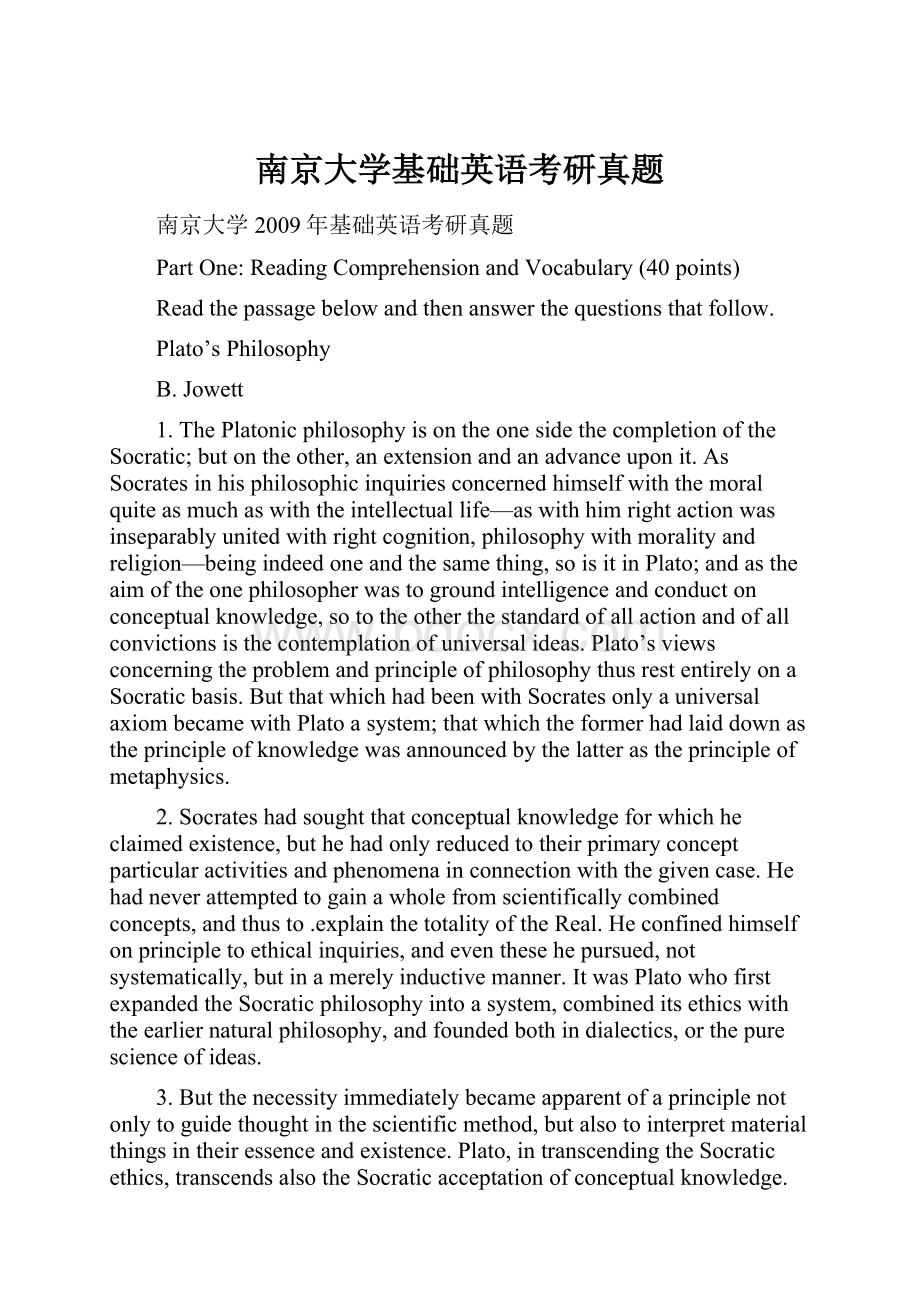 南京大学基础英语考研真题.docx
南京大学基础英语考研真题.docx
- 文档编号:29666878
- 上传时间:2023-07-26
- 格式:DOCX
- 页数:17
- 大小:28.22KB
南京大学基础英语考研真题.docx
《南京大学基础英语考研真题.docx》由会员分享,可在线阅读,更多相关《南京大学基础英语考研真题.docx(17页珍藏版)》请在冰豆网上搜索。

南京大学基础英语考研真题
南京大学2009年基础英语考研真题
PartOne:
ReadingComprehensionandVocabulary(40points)
Readthepassagebelowandthenanswerthequestionsthatfollow.
Plato’sPhilosophy
B.Jowett
1.ThePlatonicphilosophyisontheonesidethecompletionoftheSocratic;butontheother,anextensionandanadvanceuponit.AsSocratesinhisphilosophicinquiriesconcernedhimselfwiththemoralquiteasmuchaswiththeintellectuallife—aswithhimrightactionwasinseparablyunitedwithrightcognition,philosophywithmoralityandreligion—beingindeedoneandthesamething,soisitinPlato;andastheaimoftheonephilosopherwastogroundintelligenceandconductonconceptualknowledge,sototheotherthestandardofallactionandofallconvictionsisthecontemplationofuniversalideas.Plato’sviewsconcerningtheproblemandprincipleofphilosophythusrestentirelyonaSocraticbasis.ButthatwhichhadbeenwithSocratesonlyauniversalaxiombecamewithPlatoasystem;thatwhichtheformerhadlaiddownastheprincipleofknowledgewasannouncedbythelatterastheprincipleofmetaphysics.
2.Socrateshadsoughtthatconceptualknowledgeforwhichheclaimedexistence,buthehadonlyreducedtotheirprimaryconceptparticularactivitiesandphenomenainconnectionwiththegivencase.Hehadneverattemptedtogainawholefromscientificallycombinedconcepts,andthusto.explainthetotalityoftheReal.Heconfinedhimselfonprincipletoethicalinquiries,andeventhesehepursued,notsystematically,butinamerelyinductivemanner.ItwasPlatowhofirstexpandedtheSocraticphilosophyintoasystem,combineditsethicswiththeearliernaturalphilosophy,andfoundedbothindialectics,orthepurescienceofideas.
3.Butthenecessityimmediatelybecameapparentofaprinciplenotonlytoguidethoughtinthescientificmethod,butalsotointerpretmaterialthingsintheiressenceandexistence.Plato,intranscendingtheSocraticethics,transcendsalsotheSocraticacceptationofconceptualknowledge.Thecognitionofideas,Socrateshadsaid,istheconditionofalltrueknowledgeandrightaction.Therefore,concludesPlato,logicalthoughtisalonetrueknowledge.Allotherwaysofknowing—presentation,envisagement—affordnoscientificcertaintyofconviction.Butiftheknowledgeoftheideaisalonerealknowledge,thiscanonlybe,accordingtoPlato,becausethataloneisaknowledgeoftheReal;becausetrueBeingbelongsexclusivelytotheessenceofthingspresentedintheidea,andtoallelse,inproportiononlyasitparticipatesintheidea.Thustheidealizingoftheconcept,whichwithSocrateshadbeenalogicalpostulateinvolvingacertainscientificdexterity,dialecticalimpulse,anddialecticalart,wasnowraisedtotheobjectivecontemplationoftheworld,andperfectedintoasystem.
4.This,however,wasimpossiblewithoutintroducingasharperdiscriminationbetweenintellectualandmoralactivity.HedistinguishesmoresharplythanSocratesbetweenthemoraldirectionofthewillandscientificcognition,butdoesnottherefore,likeAristotle,makephilosophyatheoreticalactivity.HecompletestheSocraticethicsnotonlywithdialecticalbutwithphysicalinvestigations:
thelatter,however,neverprosperinhishands.
5.Platogivestoconcepts,asseparatesubstances,therealityofideas;butinholdingideastobetheonlyreality,andmaterialthings,assuch,tobedevoidofessence,andnonexistent,hemakesimpossibletohimselftheexplanationofthephenomenalworld.Heperfectstheconceptualphilosophyintoasystem,butisnotimpelled,likehissuccessor,toenterdeeplyintoparticulars:
tohimtheideaonlyisthetrueobjectofthought;theindividualphenomenonpossessesnointerest.Hecanindeedmakeuseofittobringtolighttheideainwhichitparticipates,butthatthoroughcompletenesswithwhichAristotleworkshiswaythroughempiricaldataisnothisconcern.
6.Thestudyofparticularsseemstohimscarcelymorethananintellectualpastime,andifhehasforawhileoccupiedhimselfwithit,healwaysreturns,asifwearied,tothecontemplationofpureideas.Inthisrespectalso,hestandsmidwaybetweenSocratesandAristotle.Inthesameproportion,however,thatPlatoadvancedbeyondSocrates,itwasinevitablethatheshouldgobacktothepre-Socraticdoctrines,andregardashisco-disciplesthosewhowerethenseekingtoapplythosetheoriestotheperfectingoftheSocraticdoctrine.
7.PlatoisthefirstoftheGreekphilosopherswhonotmerelyknewandmadeuseofhispredecessors,butconsciouslycompletedtheirprinciplesbymeansofeachother,andboundthemalltogetherinonehigherprinciple,seekingnotmerelytheessentialnatureofmoralactivities,buttheessentialnatureoftheReal.Heisthusinevitably,directedtowardstheassumptionsofhispredecessors,whichhadallstartedfromsometrueperception;butwhiletheseassumptionshadrelatedentirelyandexclusivelytooneanother,Plato’sscientificprinciplesrequiredthatheshouldfusethemallintoahigherandmorecomprehensivetheoryoftheworld.AsthereforePlato’sknowledgeoftheearlierdoctrinesgavehimthemostdecidedimpulseinthedevelopmentoftheSocraticteaching,itwasconverselythatdevelopmentwhichaloneenabledhimtousethecombinedachievementsoftheotherphilosophersforhisownsystem.
8.TheSocraticconceptualphilosophywastransplantedbyPlatointothefruitfulandwell-tilledsoilofthepreviousnaturalphilosophy,thencetoappropriatetoitselfallkindredmatter;andinthuspermeatingtheolderspeculationwiththespiritofSocrates,purifyingandreformingitbydialectic,whichwasitselfextendedtometaphysicalspeculation.Inthusperfectingethicsbynaturalphilosophyandnaturalphilosophybyethics,Platohasaccomplishedoneofthegreatestintellectualcreationseverknown.Philosophycouldnotindeedpermanentlyremainintheformthengiventoit.Aristotlesoonmadeveryessentialalterations,inthetheoriesofhismaster;theolderAcademyitselfcouldnotmaintainthemintheirpurity,andthelatersystemsthatthoughttoreproducethesystemofPlatowereself-deceived.ButthisispreciselyPlato’sgreatness—thathewasabletogivetheprogressofphilosophyanimpulsesopowerful,sofartranscendingthelimitsofhisownsystem,andtoproclaimthedeepestprincipleofallrightspeculation—theidealismofthought—withsuchenergy,suchfreshnessofyouthfulenthusiasm,thattohim,despiteallhisscientificdeficiencies,belongsthehonorofforeverconferringphilosophicconsecrationonthoseinwhomthatprinciplelives.
9.InPlato’sscientificmethod,also,werecognizethedeepening,thepurification,andtheprogressoftheSocraticphilosophy.Fromtheprincipleofconceptualknowledgearises,asitsimmediateconsequence,thatdialecticofwhichSocratesmustbeconsideredtheauthor.ButwhileSocratescontentedhimselfwithdevelopingtheconceptoutofmereenvisagement,Platofurtherdemandedthatconceptualscienceshouldbedrawnoutbymethodicalclassificationintoasystem;whileSocrates,informingconcepts,startsfromthecontingenciesofthegivencase,andnevergoesbeyondtheparticular,Platorequiresthatthoughtshallarise,bycontinuedanalysis,fromconditionedtounconditioned,fromthephenomenontotheidea,fromparticularideastothehighestandmostuniversal.
10.TheSocraticdialecticonlysetitselftogaintheartofrightthinkingfortheimmediateuseofindividualstopurifytheircrudepresentationsintoconcepts:
thepracticeofdialecticwasthereforeatthesametimeeducational;intellectualandmoralactivitycoincided,asmuchfortheworkofthephilosopherinitselfasforitseffectonothers.ThePlatonic,dialectic,ontheotherhand,wassubservienttotheformationofasystem;ithas,therefore,ascomparedwiththeSocratic,largeroutlinesandamorefixedform.Whatintheonewasamatterofpersonaldiscipline,intheotherbecomesconsciousmethodreducedtogeneralrules;whereastheformeraimedateducatingindividualsbytrueconcepts,thelatterseeksoutthenatureandconnectionofconcepts,inthemselves:
itinquiresnotmerelyintomoralproblemsandactivities,butintotheessentialnatureoftheReal,proposingasitsendascientificrepresentationoftheuniverse.
11.ButPlatodoesnotgosofarinthisdirectionasAristotle.HecaresfarlessforthatequalspreadofscientificknowledgeintoalldepartmentswhichAristotledesiredthanforthecontemplationoftheideaassuch.Heregardstheempiricalpartlyasahelptotheattainmentoftheidea—aladdertobeleftbehindifwewouldgaintheheightsofthought;partlyasatypeofthenatureandinherentforceoftheideas—aworldofshadows,towhichthephilosopheronlytemporarilydescends,forthwithtoreturnintotheregionoflightandpureBeing.
12.Whereas,therefore,Socratesinthemainconfineshimselftoasearchforconcepts,thecognitionofwhichisforhimmoraleducation;whereasAristotleextendsinductionanddemonstration,purelyintheinterestsofscience,overalltheActual—thespecialpeculiarityofPlatoisthatmoraleducation,intellectualteaching,and,inscienceitself,theformationofconceptsandtheirdevelopment,inspiteofpartialseparation,areyet,withhim,internallyheldtogetherandunitedbytheircommonaim,bothleadingtothatcontemplationoftheidea,whichisatthesametimelifeintheidea.Thispositionisnotindeedinvariable.Wesee,intheDialogues,Socraticinductionatfirstdecidedlypredominatingovertheconstructiveelement,thenbothintermingling,and,lastly,inductivepreparationrecedingbeforesystematicdeduction;correspond
- 配套讲稿:
如PPT文件的首页显示word图标,表示该PPT已包含配套word讲稿。双击word图标可打开word文档。
- 特殊限制:
部分文档作品中含有的国旗、国徽等图片,仅作为作品整体效果示例展示,禁止商用。设计者仅对作品中独创性部分享有著作权。
- 关 键 词:
- 南京大学 基础 英语 考研
 冰豆网所有资源均是用户自行上传分享,仅供网友学习交流,未经上传用户书面授权,请勿作他用。
冰豆网所有资源均是用户自行上传分享,仅供网友学习交流,未经上传用户书面授权,请勿作他用。


 《贝的故事》教案4.docx
《贝的故事》教案4.docx
